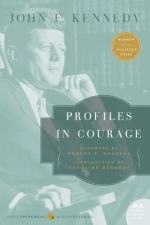
|
| Name: _________________________ | Period: ___________________ |
This test consists of 15 multiple choice questions and 5 short answer questions.
Multiple Choice Questions
1. How many votes were needed to convict the President?
(a) 40.
(b) 66.
(c) 36.
(d) 54.
2. Who was the Democratic majority leader in the Senate who later became Vice President?
(a) Jacob Javits.
(b) Richard Nixon.
(c) Alben Barkley.
(d) John Nance Garner.
3. Who made the statement that when he had made up his mind it was not in the power of man to divert him?
(a) Sam Houston.
(b) Andrew Jackson.
(c) John C. Calhoun.
(d) Lucius Lamar.
4. What were the circumstances that brought Edmund G. Ross to Congress as Senator from Kansas?
(a) A landslide vote of the Kansas people.
(b) He was sent after a recall of Senator Lane.
(c) The resignation of Senator Lane who was a reconstructionist.
(d) The suicide of his predecessor, Senator Jim Lane.
5. Who was the Senator from Nebraska who opposed President Woodrow Wilson's Armed Ship Bill?
(a) James W. Grimes.
(b) Lucius Lamar.
(c) George W. Norris.
(d) Rutherford Hayes.
6. How was Lamar similar to author Joel Harris?
(a) Lamar had a pet named Br'er Rabbit.
(b) Lamar wrote a book called Tunes of the South.
(c) Lamar, like Harris, told tales about the South.
(d) Lamar, like Harris, was a graduate of Oxford.
7. How did Taft's candor cause him to lose his party's nomination for President?
(a) His answers were always truthful and very often blunt.
(b) He did not always say exactly what he meant.
(c) People thought you could not trust a man like that.
(d) His candor caused him to be overly tactful.
8. What Senator had to be carried into the Senate to cast his vote on Johnson's impeachment?
(a) William Pitt Fessenden.
(b) James W. Grimes.
(c) Joseph Smith Fowler.
(d) John B. Henderson.
9. How did Lamar view the free silver movement of 1877?
(a) He saw it as a depletion of the nation's silver.
(b) He was too ill to pay it much attention.
(c) He supported it to help save Mississippi.
(d) He saw it as creating easy inflationary money.
10. Of the 54 Senator in Congress, how many were openly opposed to the impeachment?
(a) About half of the Republicans and all of the Democrats.
(b) Thirty-six radical Republicans.
(c) Six Republicans and twelve Democrats.
(d) Only the twelve Democrats in the Senate.
11. What position did Lamar take after the Civil War?
(a) That people should save their confederate money.
(b) The way to end the South's suffering was compromise and reconciliation with the North.
(c) That those who supported the Union should be tried as war criminals.
(d) That laws needed to be enacted to punish carpetbaggers.
12. What character traits did Henry Adams consider that Lamar possessed above all others?
(a) Amiability and aimlessness.
(b) Stubbornness and greed.
(c) Tact and humor.
(d) Envy and averace.
13. Why was Norris' candidate for President unpopular in 1928?
(a) He was a Socialist.
(b) He was a Radical.
(c) He was a Catholic.
(d) He wore a moustache.
14. On what basis did Edmund G. Ross claim his right not to decide until all the evidence was presented against Johnson.
(a) He wanted the publicity.
(b) He was trying to get bribe money for his vote.
(c) He thought it was all a big joke.
(d) He had taken the oath of impartiality.
15. What was Lamar able to convince President Hayes to do?
(a) Withdraw occupation troops and restore Home Rule in key states.
(b) Apologize to the South for certain military actions during the war.
(c) Appoint Southerners to key positions in his cabinet.
(d) Give Tilden a much sought after ambassadorship.
Short Answer Questions
1. What was Johnson's purpose as President that caused him problems with the Radical Republicans?
2. What unwanted praise did Norris and his group receive after the filibuster?
3. What was Sen. Albert Beveridge's famous statement after he was defeated for speaking out against the Payne-Aldrich Tariff Act?
4. How had President Johnson come to power?
5. Did Norris always oppose President Wilson's measures?
|
This section contains 783 words (approx. 3 pages at 300 words per page) |

|




